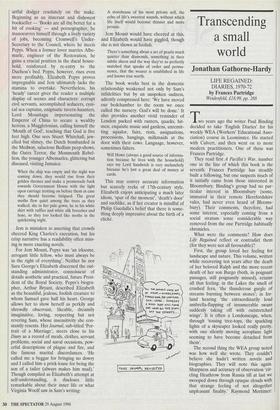Transcending a small world
Jonathan Gathorne-Hardy
LIFE REGAINED: DIARIES, 1970-72 by Frances Partridge Weidenfeld, £18.99, pp. 288 Two years ago the writer Paul Binding decided to take 'English Diaries' for his weekly WEA (Workers' Educational Asso- ciation) course in Leominster. He started with Culvert, and then went on to more modern practitioners. One of these was Frances Partridge.
They read first A Pacifist's War, number one in the line of which this book is the seventh. Frances Partridge has steadily built a following, but one suspects much of it initially came from those interested in Bloomsbury. Binding's group had no par- ticular interest in Bloomsbury (some, immured in their remote Herefordshire vales, had never even heard of Blooms- bury). Their comments, therefore, had some interest, especially coming from a social stratum some considerable way removed from the one Partridge habitually chronicles.
What were the comments? How does Life Regained reflect or contradict them (for they were not all favourable)?
First, the group loved her feeling for landscape and nature. This volume, written while recovering ten years after the death of her beloved Ralph and the more recent death of her son Burgo (both, in poignant passages, still poignantly missed), retains all that feeling: in the Lakes the smell of crushed fern, 'the thunderous gurgle of streams bursting between stones'; in Ire- land hearing 'the extraordinarily loud umbrella-flapping of innumerable swans suddenly taking off with outstretched wings'. It is often a Londonscape, when, through 'tossing tree-tops, the sparkling lights of a skyscaper looked really pretty, with one silently moving aeroplane light seeming to have become detached from them'.
The second thing the WEA group noted was how well she wrote. They couldn't believe she hadn't written novels and biographies. They will note this again. Sharpness and accuracy of observation 'cir- cling Heathrow from Russia till at last we swooped down through opaque clouds with that strange feeling of not altogether unpleasant finality.' Raymond Mortimer: `When he says "Ah!" in response to some remark one knows it has bored him.' On open-mindedness: 'I feel some minds can be too open, the doors can get positively flabby from being allowed to flap about too freely.'
How well she wrote — and also how amusingly; and so she does still. Raymond Mortimer says, 'I always nod to our post- man when he brings the letters in the morning.' Dadie (Rylands): 'Oh, really, Ray? How extraordinarily kind and conde- scending of you! You mean you actually say "Good morning" or something of the sort?'
The workers had criticisms, especially the women. Compared to their war, Frances Partridge's seemed fairly cushy. They also noted her attacks on the rich when as far as they were concerned she was rich and didn't seem to appreciate it enough. It was also rather a limited, cir- cumscribed cast. Perhaps there is some truth here — but who wants to read the diary of a saint? And are not the casts in most diaries circumscribed? Even Saint- Simon is circumscribed. It is from the very coherence and contraction of their cast that the strengths of these diaries derive. It allows fascinating extended narratives to unroll. Here the main one is the gradual, tragi-comic, painful, disintegration, from amphetamines, drink, age and the loss of her husband to a younger woman, of Par- tridge's best friend Julia Strachey. Julia bullies Frances, blames her, uses her merci- lessly — once sending her out in heavy rain to buy foie-gras and thin-skinned oranges and then deciding she doesn't want them — and finally sacks her. Frances still gets news — from Heywood Hill, who sees Julia and notices a front tooth missing. He feels he'd better not comment (Julia is 'a little wild') but she explains herself: 'A shower of saucepans fell on me'; but mostly through Margaret Penrose, who takes on Julia, and whose own marriage, rocking violently and deafeningly under Lionel's affair, forms the second major narrative.
There have been dozens of similar narra- tives — and these diaries stretch back, essentially, to 1939 — but what Frances Partridge is finally achieving is to depict and preserve — I almost wrote create — a Completed segment of English society in the last two thirds of the 20th century, pre- serving their loves, their hates, the birth of their children, their talk, their deaths.
That is to say, the Diaries, though teth- ered in their small world, transcend it. Like all significant microcosms, this is also the macrocosm. Birth, death, love, divorce • • . in chronicling over time this group of people she has chronicled life.
Paul Binding's group realised this. He also introduced them to Virginia Woolf, Stephen Spender and Carrington's diaries and letters. Of them all, they liked Frances Partridge best. Many of them went on to her other Diaries. They will get this one from the library too. But this wise, humor- ous, indomitable, most loveable woman still, at 98, keeps her diaries. There are, the Workers' Educational Association of Leominster will be pleased to learn, many more to come.



























































 Previous page
Previous page